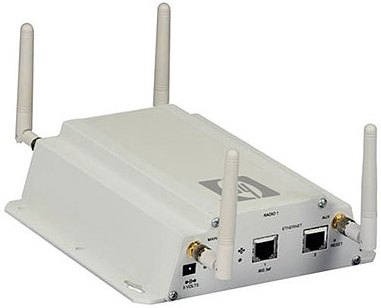Offer details
Description
HP offers intelligent single, dual and tri radio Access Points designed to provide reliable, easy-to-use wireless connectivity across the network. HP also offers integrated RF Security Sensors in some of their APs. All the HP E-series MSM Access Points and integrated RF Security Sensors operating are managed by any of the HP E-series MSM Controllers and the HP RF Manager for the RF Security Sensors. All the HP E-series Access Points can also work in autonomous mode. The HP E-series MSM Access Points require a single Power over Ethernet (PoE) cable drop and are IEEE802.3af compliant or can be powered directly via a power adaptor. HP has a full range of both indoor and outdoor E-series Access Points.
- IEEE 802.1p prioritization: delivers data to devices based on the priority and type of traffic. SpectraLink voice priority (SVP) support: prioritizes SpectraLink voice IP packets sent from a SpectraLink NetLink SVP server to SpectraLink wireless voice handsets to help ensure excellent voice quality. Wireless: - L2/L3/L4 classification: IEEE 802.1p VLAN priority, SpectraLink SVP and DiffServ. - Wi-Fi MultiMedia (WMM), IEEE 802.11e EDCF, and Service-Aware priority assigned by VSC. - Maximum VoIP call capacity: 12 active calls on IEEE 802.11a/b/g/n. Network management: - Fully manageable using HP
- Auto-MDIX: automatically adjusts for straight-through or crossover cables on all 10/100 ports. IEEE 802.3af Power over Ethernet (PoE) support: simplifies deployment and dramatically reduces installation costs by helping to eliminate the time and cost involved in supplying local power at each access point location.
- Anywhere, anytime wireless coverage:
- Single, dual, and tri-radio IEEE 802.11a/b/g access points.
- Per-radio software-selectable configuration of frequency bands.
- Self-healing, self-optimizing local mesh extends network availability.
- Wi-Fi Alliance certified for interoperability with all 802.11a/b/g client devices .
- IEEE 802.3af PoE or external power cord on selected models . Interoperability: Wi-Fi Alliance certifications, including IEEE 802.11g Wi-Fi and WPA2 to help ensure multivendor interoperability. Virtual Service Communities (VSCs): - Up to 16 SSIDs, each with unique MAC addre
- Choice of IEEE 802.11i, Wi-Fi Protected Access 2 (WPA2), or WPA: locks out unauthorized wireless access by authenticating users prior to granting network access; robust Advanced Encryption Standard (AES) or Temporal Key Integrity Protocol (TKIP) encryption secures the data integrity of wireless traffic. Local wireless bridge client traffic filtering: when enabled, prevents communication between wireless devices associated with the same access point. IEEE 802.1X: provides port-based user authentication with support for Extensible Authentication Protocol (EAP) MD5, TLS, TTLS, and PEAP with choic
- IEEE 802.1p prioritization: delivers data to devices based on the priority and type of traffic. SpectraLink voice priority (SVP) support: prioritizes SpectraLink voice IP packets sent from a SpectraLink NetLink SVP server to SpectraLink wireless voice handsets to help ensure excellent voice quality. Wireless: - L2/L3/L4 classification: IEEE 802.1p VLAN priority, SpectraLink SVP and DiffServ. - Wi-Fi MultiMedia (WMM), IEEE 802.11e EDCF, and Service-Aware priority assigned by VSC. - Maximum VoIP call capacity: 12 active calls on IEEE 802.11a/b/g/n. Network management: - Fully manageable using HP
- Auto-MDIX: automatically adjusts for straight-through or crossover cables on all 10/100 ports. IEEE 802.3af Power over Ethernet (PoE) support: simplifies deployment and dramatically reduces installation costs by helping to eliminate the time and cost involved in supplying local power at each access point location.
- Anywhere, anytime wireless coverage:
- Single, dual, and tri-radio IEEE 802.11a/b/g access points.
- Per-radio software-selectable configuration of frequency bands.
- Self-healing, self-optimizing local mesh extends network availability.
- Wi-Fi Alliance certified for interoperability with all 802.11a/b/g client devices .
- IEEE 802.3af PoE or external power cord on selected models . Interoperability: Wi-Fi Alliance certifications, including IEEE 802.11g Wi-Fi and WPA2 to help ensure multivendor interoperability. Virtual Service Communities (VSCs): - Up to 16 SSIDs, each with unique MAC addre
- Choice of IEEE 802.11i, Wi-Fi Protected Access 2 (WPA2), or WPA: locks out unauthorized wireless access by authenticating users prior to granting network access; robust Advanced Encryption Standard (AES) or Temporal Key Integrity Protocol (TKIP) encryption secures the data integrity of wireless traffic. Local wireless bridge client traffic filtering: when enabled, prevents communication between wireless devices associated with the same access point. IEEE 802.1X: provides port-based user authentication with support for Extensible Authentication Protocol (EAP) MD5, TLS, TTLS, and PEAP with choic
Specifications
| Performance | |
|---|---|
| 2.4 GHz | Yes |
| Frequency band | 2.41 - 2.46, 5.18 - 5.83 GHz |
| Quality of Service (QoS) support | Yes |
| Ethernet LAN data rates | 10,100 Mbit/s |
| Maximum data transfer rate | 54 Mbit/s |
| Features | |
| 2.4 GHz | Yes |
| Frequency band | 2.41 - 2.46, 5.18 - 5.83 GHz |
| Quality of Service (QoS) support | Yes |
| Ethernet LAN data rates | 10,100 Mbit/s |
| Cabling technology | 10/100Base-T(X) |
| Maximum data transfer rate | 54 Mbit/s |
| Security | |
| Security algorithms | WPA,WPA-TKIP,WPA2 |
| MAC address filtering | Yes |
| Protocols | |
| Management protocols | SNMP v2c,v3 |
| Supported network protocols | DHCp, PEAP, PAP, CHAP, MS-CHAPv2 |
| Ports & interfaces | |
| Ethernet LAN (RJ-45) ports | 2 |
| Cabling technology | 10/100Base-T(X) |
| Power | |
| Power consumption (typical) | 8.6 W |
| Power requirements | 5V |
| Power over Ethernet (PoE) | Yes |
| Design | |
| Internal | No |
| Antenna | |
| Antenna gain level (max) | 2 dBi |
| Antenna connector type | RP-SMA |
| Weight & dimensions | |
| Dimensions (WxDxH) | 165 x 162 x 48 mm |
| Weight | 680 g |
| Other features | |
| Compliance industry standards | IEEE 802.3, IEEE 802.3af, IEEE 802.11a/b/g |








